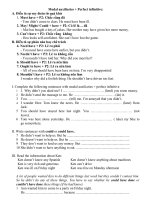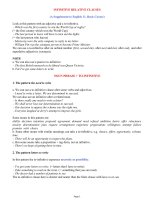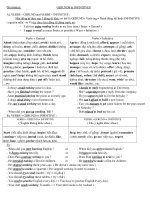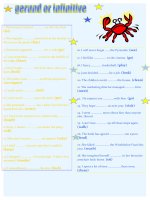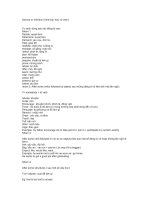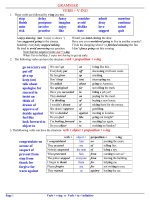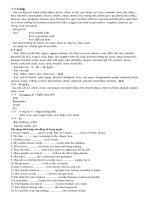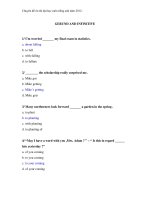Gerund-Infinitive-Bare infinitive
Bạn đang xem bản rút gọn của tài liệu. Xem và tải ngay bản đầy đủ của tài liệu tại đây (23.54 KB, 2 trang )
INFINITIVE (TO.V) (Động từ nguyên thể có TO)
1. Động từ nguyên thể có TO được dùng sau hầu hết các động từ có chia với chủ ngư.õ
Thí dụ:
He decided to sell his motorcycle
We hope to pass the examination.
2. Động từ nguyên thể có TO được dùng sau hầu hết các danh từ,đại từ,tính từ và phó từ.
Thí dụ:
They save money to buy a new house.
The doctor advised me to take this drug.
The questions are difficult to answer.
She drives carefully to avoid accidents.
BARE INFINITIVE (V) (Động từ nguyên mẫu không có TO)
1. Động từ nguyên mẫu không có TO được dùng sau các trợ động từ WILL,WOULD,CAN,COULD,MAY,MIGHT,
OUGHT TO,SHALL,SHOULD, MUST,...
Thí dụ:
She will visit you soon.
You must answer all the questions.
2. Sau bổ ngữ của các động từ MAKE (bắt buộc),LET (để cho,cho phép),và các động từ về nhận thức như SEE
(thấy),HEAR (nghe),WATCH (nhìn,theo dõi),NOTICE (chú ý,để ý,nhận thấy),FEEL (cảm thấy),LISTEN TO (lắng
nghe),SMEEL (ngửi thấy)....
Thí dụ:
He made them work very hard.
She lets her children sleep on the floor.
You will see him play the piano on TV tonight.
Nobody noticed John enter the room.
Ghi chú:
* Nếu các động từ trên được dùng ở thể bò động thì động từ theo sau ở dạng nguyên thể có TO
Thí dụ:
They were made to work very hard.
He will be seen to play
* Sau bổ ngữ của các động từ về nhận thức như SEE,HEAR,WATCH,NOTICE ...ta có thể dùng 1 hiện tại phân từ
có dạng V+ ing để chỉ 1 sự việc đang xảy ra.
Thí dụ:
I saw the children playing in the gảden.
I listen to them talking in the next room.
GERUND (V.ing) (Danh động từ)
1. Danh động từ được dùng sau các giới từ như IN,ON,AT,BY,FOR,WITHOUT,WHEN,AFTER,BEFORE ...
Thí dụ:
I am interested in reading books.
By trying hard,you can pass the examination.
She left the room without saying good-bye.
Ghi chú:
* Sau 2 giới từ EXCEPT và BUT (trừ ra,ngoại trừ),ta dùng động từ nguyên thể không có TO
Thí dụ:
I will do anything except look after the baby.
2. Sau các tính từ sở hữu như MY,HIS,OUR,THEIR ... và danh từ ở sở hữu cách.
Thí dụ:
Their winning the game surprised all of us.
I don’t like his being here.
My sister’s returning home late made our parents anxious.
3. Sau các động từ AVOID (tránh),CONSIDER (cân nhắc,xem xét),ENJOY (thích),KEEP (cứ),MIND (chú ý,để ý,bận
tâm,phiền),PRACTISE (luyện tập),FINISH (chấm dứt,hoàn thành),SUGGEST (đề nghò),và sau các thành ngữ như
CAN’T HELP (không thể nào không),BE WORTH (đáng),BE NEAR (suýt nữa),BE BUSY (bận rộn),IT’S NO GOOD,
IT’S NO USE (không có giá trò,không có ích lợi gì),BE/GET USED TO (quen,trở nên quen với)
Thí dụ:
She has avoided meeting me
EXERCISE
Put the verbs in right form:
1. I am considering (take)__________a trip to Europe next year.
2. I enjoy (study)__________with Miss Smith.
3. Mr Brown stopped (go)__________to his English class.
4. Do you mind (wait) __________ a few minutes in the receptionroom.?
5. We are considering (buy) __________an automobile.
6. Did you enjoy (travel) __________through Germany last summer?
7. Why has Miss John stopped (study) __________ English?
8. Ask that salesman whether he minds (come) __________back this afternoon.
9. Her nephew enjoys (listen) __________to the radio.
10. Tom and Mary have stopped (talk) __________ to each other.
11. The teacher is considering (hold) __________the classes in the evening instead of the morning.
12. We should avoid (give) __________ an answer immediately.
13. They have finished (paint) __________ our apartment at last.
14. The policeman was driving fast and couldn’t avoid (hit) __________the other car.
15. You shouldn’t risk (go) __________out if you have a cold.
16. I dislike (ride) __________on the subway.
17. He admitted (make) __________the mistake after we questioned him for a long time.
18. Would you mind (open) __________the windows.
19. Why did he deny (take) __________the key?
Und erline the correct form
1. A busy can’t stand (waiting/to wait) in line.
2. Do you enjoy (to be/being) in the United States?
3. Students must practise (using/to use) different words.
4. John finished (ironing/to iron) his shirt a few minutes ago.
5. Would you please stop (talking/to talk) so loudly?
6. Do you hope (getting/to get) your degree by next year?
7. I hesitate (to say/saying) what I mean.
8. Birds have to learn (to use/using) their wings.
9. Men of peace have attempted (putting/to put) an end to war.
10. Can that student demand (to see/seeing) his grades?
11. He surely expects (to pay/paying)all of his bills.
12. My father is planning (changing,to change) jobs shortly.
13. Did the cook remember (to add/adding) salt?
Build a complete sentence with the given words
1. I/hope/see/doctor/meeting
2. teacher/order/students/keep silent/class
3. when/he/get home/see/children/sitting/floor
4. it/not easy/meet/manager/office
5. parents/make/go/bed/early
6. you/good enough/pass/examination
7. I/look forward/receive/letter
8. we/not mind/wait/more minutes
9. she/like/read/romantic stories
10. father/be/used/drink/tea/meals
11. children/busy/collect/shells/beach
12. we/enjoy/spend/summer vacation/Dalat
